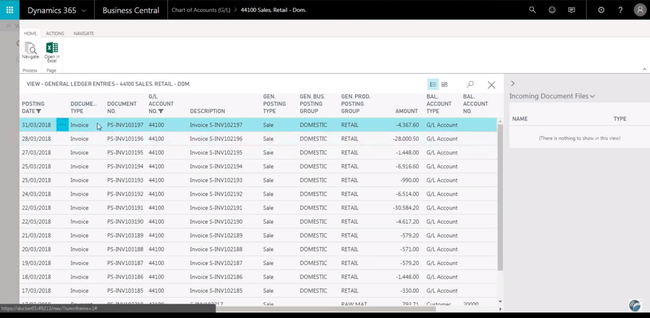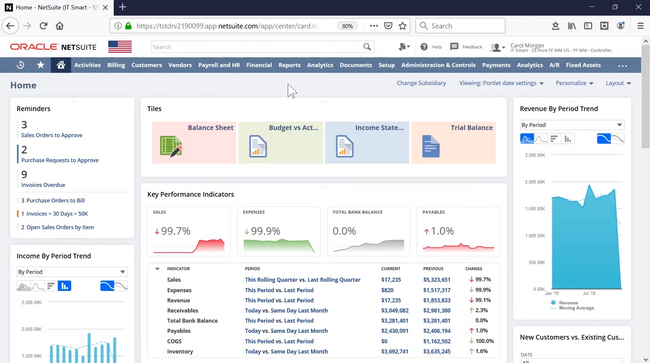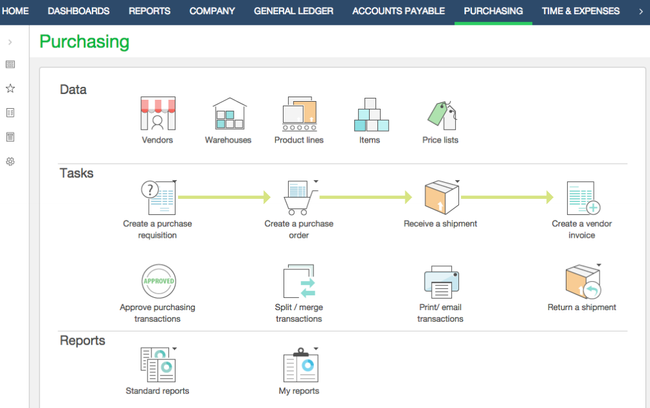Enterprise resource planning software, often just called ERP, is made to cover back-end operations at a business. These systems encompass everything from basic accounting to HR operations and supply chain management. To help you choose the right solution for your business, we used our software review methodology to evaluate and rank the best small business ERP systems in the market today.
- Dynamics 365: Best Overall
- NetSuite: Most Customizable
- Sage Intacct: Strong Financial Management
- SAP Business One: Best CRM Features
- Odoo: Best Open Source Solution
- Acumatica: Best for Small Businesses
- SYSPRO: Best for Distribution
- Epicor Kinetic: Best for Manufacturing
- Striven: Best for Project-based Businesses
- ERPNext: Best for Global SMEs
1 Dynamics 365 - Best Overall
Why we chose it: Dynamics 365 Business Central is our best overall pick because it provides an all-encompassing solution tailored to SMBs. Its comprehensive tools include financial, inventory, project, sales and purchasing, and customer relationship management.
We found scalability to be its greatest strength. Its inherent flexibility means it can be adapted to align with unique business workflows. Its cloud-based convenience, combined with its low total cost of ownership, makes Business Central a cost-effective choice for smaller firms working within tight budget constraints.
2 NetSuite - Most Customizable
Why we chose it: NetSuite is our top pick for businesses seeking ERP customizations. Whether it’s a B2B or B2C company, firms can mold NetSuite to provide the optimal fit.
Businesses can harness tools like SuiteScript for full automation and integration with third-party apps. They can also finetune the system with tailored forms, custom fields, personalized roles, and real-time dashboards. These features collectively enhance operational compatibility, letting businesses manage data and processes in ways most aligned with their daily functions.
3 Sage Intacct - Strong Financial Management
Why we chose it: We picked Sage Intacct for its advanced financial management capabilities. It offers a multi-dimensional general ledger that tracks financial data based on multiple dimensions, such as department, project, location, or product line. This enables detailed financial reporting and analysis, providing insights into the performance of different business segments.
The platform includes features for automated revenue recognition, helping businesses comply with standards like ASC 606 and IFRS 15. It supports various revenue recognition methods and provides real-time visibility into revenue streams.
4 SAP Business One - Best CRM Features
Why we chose it: We found SAP Business One is best for CRM features because it offers marketing campaigns, customer master data, and opportunity and sales management in a central platform.
SAP Business One allows users to create and maintain email, telemarketing, and direct mail campaigns. It also allows users to manage sales opportunities and track activities. The software provides a service component in CRM to manage warranties and service contracts. Finally, it offers strong analytics and reporting to gain insights into customer data and sales performance.
5 Odoo - Best Open Source Solution
Why we chose it: We believe Odoo stands out as the best open-source solution due to its unparalleled flexibility and adaptability. Firms can access and customize the source code to fit their specific needs. This can help small businesses save on software costs and ensure they have a system that meets their unique requirements.
Odoo has a large and active community of developers and users who share knowledge, best practices, and custom modules. This can help small businesses get support and find solutions to common challenges.
6 Acumatica - Best for Small Businesses
Why we chose it: We think Acumatica is a good pick for small businesses because it has a resource-based pricing model. This means small companies pay for the resources they actually use, rather than for the number of employees or users added to the system.
Beyond the licensing model, Acumatica offers a wide variety of third-party add-ons and can be personalized to fit the way your small organization operates. This includes CRM, eCommerce, and other financial management systems.
As your small business expands, it will need to grow and adapt. Being able to pick and choose the modules you need and add more as your requirements change means Acumatica is a scalable software perfect for a growing small business.
7 SYSPRO - Best for Distribution
Why we chose it: SYSPRO caters to the unique needs of distribution companies, offering specialized modules for compliance regulations, quality control, and traceability. Additionally, this ERP integrates key business areas like finance, inventory management, sales, purchasing, production planning, and CRM into a centralized system.
We also found SYSPRO compatible with smaller businesses because it’s designed to evolve with company growth. Its scalability ensures that as organizations expand, the system can adapt to their changing needs without requiring a complete overhaul. Moreover, SYSPRO’s reporting and analytics capabilities enable businesses to generate detailed reports, analyze trends, and make data-driven decisions. This feature is useful for small distributors that need to optimize their operations and stay competitive.
8 Epicor Kinetic - Best for Manufacturing
Why we chose it: We recommend Epicor Kinetic for small to medium-sized businesses in discrete manufacturing environments due to its industry-specific feature set. These include compliance management, planning and scheduling, supply chain management, quality assurance, and maintenance management. Tools like a product configurator, advanced planning and scheduling, and quality assurance make it ideal for businesses in this sector.
In addition to a focus on discrete manufacturing, Epicor Kinetic delivers extensive customization capabilities. Its low-code customization allows businesses to tailor the ERP to their unique processes without modifying the source code, providing a flexible and adaptable solution as the business grows. Finally, Epicor Kinetic offers an extensive financial management module with features like general ledger, accounts receivable/payable, and financial planning, as well as a sales management module that supports the entire order-to-cash cycle.
9 Striven - Best for Project-based Businesses
Why we chose it: Striven is particularly suited for small to medium-sized service and project-based businesses that are moving away from spreadsheets to a more unified ERP system. It’s a cloud-based platform that combines various business management tools, including accounting, CRM, project management, HR, and inventory management, into one cohesive system. This integration enhances productivity and collaboration across different departments.
Striven integrates seamlessly with third-party systems like Google, Microsoft, and various payment processing gateways. With automated workflows and a mobile responsive design, the platform also offers customizable portals for vendors, customers, and candidates to improve external communications and operations. Striven’s pricing is also competitive, making it an affordable option for small businesses looking to leverage ERP functionalities without a hefty price tag.
10 ERPNext - Best for Global SMEs
Why we chose it: ERPNext distinguishes itself as an optimal ERP solution for small and medium-sized enterprises (SMEs) operating on a global scale, particularly due to its multilingual support. This feature, combined with its comprehensive suite of business management tools, makes ERPNext a fitting choice for companies with a diverse workforce or those operating in multiple countries.
With a free open-source version and affordable managed hosting options, ERPNext provides an avenue for scaled operations without incurring significant software costs. The software handles functions from accounting, CRM, HRM, to manufacturing and project management, all designed to meet the complex needs of SMEs in various sectors.
What is Small Business ERP Software?
Small business ERP is a software system that integrates key business functions, such as accounting, sales, and inventory, to streamline operations in small businesses. Enterprise resource planning or (ERP software) specifically built for small businesses provides an affordable, easy-to-use, and secure way to manage business processes, financials, and sales in real-time. Software streamlines your work across multiple areas, from back-office accounting to front-end customer support. Both small and midsize companies can benefit from using one ERP software solution to cover a variety of business operations.
Read more: What is ERP?
Running a small business is no easy feat. Depending on your industry and market, there might be a lot of behind-the-scenes tasks you need to complete yourself. Fortunately, ERP systems typically include customizable modules you can use to meet your specific workflow needs. For smaller businesses and startups, it’s important to only choose the modules you really need to cut down on costs - you can always add more functionality later on as your business grows.
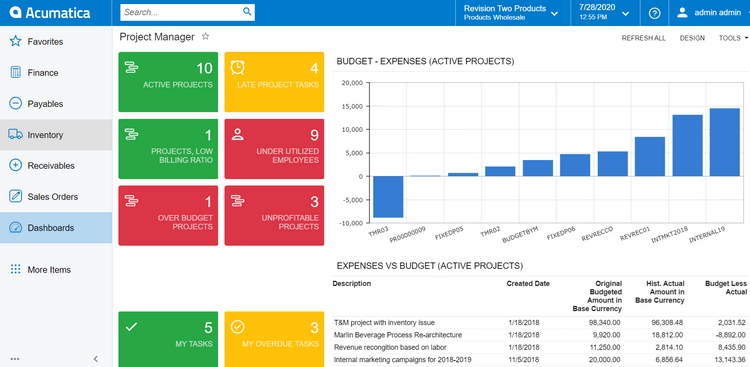
Small Business ERP Software Key Features
| Feature | Function |
|---|---|
| Human Resources (HR) Management | Automate payroll processing, track time and attendance, and manage employee records like performance reviews, payroll benefits, and scheduling. Self-service HR functionalities allow employees to request time off or view their attendance record. |
| Financial Management](/financial-management/) | Track income and expenses through recorded transactions and account structures to forecast profit and loss. |
| Inventory Management | Record information on items you build, store, buy, or sell. Keep up-to-date stock records to avoid running out of items or buying items unnecessarily. |
| Customer Relationship Management (CRM) | Manage customer contact info, order histories, invoices, and quotes. |
| Supply Chain Management | Manage the flow of goods and services from raw material acquisition to delivery of the finished product to the customer. |
| Analytics and Reporting | Measure key performance indicators (KPIs) like income (Accounts Receivable) and expenses (Accounts Payable), top performing products, or open orders over a set period of time. |
Best ERP Software Benefits for Small Businesses
The primary benefit of implementing an ERP at your growing company is the ability to streamline many separate business functions into one solution. Both on-premise and cloud-based ERP platforms can help your business in a variety of ways:
- Streamline workflows and processes across a common interface and database
- Visibility and transparency into business management workflow to increase optimization
- Better decision-making by analyzing data by region, location, profit center, employee, and more
- Improve data security to ensure key company information is not compromised
- Increase opportunities for interdepartmental collaboration on documents, files, audio and video media
- Scale operations to match your expanding business needs as you grow
Additional benefits vary depending on the exact nature of your work, your industry, and projected growth.
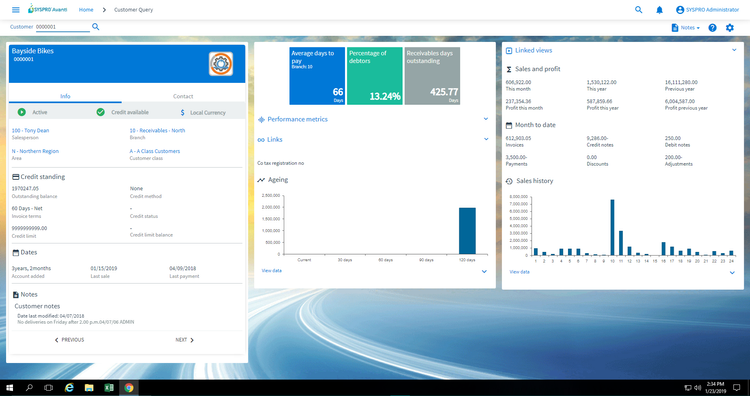
How Much Does Small Business ERP Cost?
ERP pricing varies greatly due to a variety of cost factors, including the number of concurrent users, add-on modules, implementation fees, maintenance, and employee training. Some plans are available for as low as $20 per month per user while others start at over $5,000 per month. Over the course of ownership, expect to invest between $25,000 to $150,000 on an ERP system for your small business.
Hidden ERP Costs
Be aware of hidden costs which can make ERP software much more expensive. You might think you’ve found a cheap SaaS solution for a few dollars a month only to be hit with implementation or onboarding fees. The ERP vendor you choose should be able to help you narrow down the functionalities you need to ensure your solution is as cost-effective as possible.
Free Small Business ERP Software Options
When running a small business, your operating budget is likely small, at least to start. Luckily, there are many cheap and affordable ERP solutions for SMBs. Some are even free, though sometimes this is limited to a short-term trial of services. However, there are usually some additional costs associated with these systems, such as installation fees, training, maintenance, and any add-on functionality.
Some examples of free and open source small business ERP software include:
- Odoo: The free SaaS plan, Odoo Community, is an open-source ERP software including one app of your choice (some examples include CRM, invoicing, expense tracking, eCommerce, appointment scheduling, and POS). You can add on additional apps ranging in price from $12 per month to $72 per month. Integrations with eBay or USPS will increase costs to another $36 to $72 per month.
- Dolibarr: A free, open source ERP system featuring CRM, HR, CMS, inventory control, marketing automation, and project management. Free and purchasable add-ons are also available.

Is QuickBooks an ERP System for Small Businesses?
QuickBooks is technically an accounting software, though it has many functions of a low-level ERP. Due to its low pricing, many startups and small businesses rely on QuickBooks instead of an ERP. While it can handle the absolute basics, growing companies should consider an actual ERP instead.
Integrating Small Business ERP With Other Software
When evaluating ERP solutions, don’t just rush into implementing a system because it fits at the moment - think about what you’ll need in the coming years. You might bring on more employees, open another location, or expand your professional services. As your business brings in more sales, you’ll need a more comprehensive system for order management, multi-location inventory, and more.
Many small business ERP systems allow you to add and remove modules as needed, as well as provide integration with other management systems. Some standalone software like business intelligence (BI) systems, CRM, and manufacturing execution systems (MES) might not be required for you business now, but could play an important role as you grow in the next few years. You can purchase a standalone system when you’re ready and integrate it with your ERP system without much trouble.
Other Small Business Software Solutions
Is a full ERP still too much for your growing business or startup? As mentioned before, there are specific small business ERP alternatives for different business processes:
- Small business accounting software
- Human resources software
- Invoicing software
- Small business manufacturing software
- Payroll sofware
- Recruiting software
With the right ERP software, you can help your SMB grow into a medium or even enterprise-level business.

Types of Small Business ERP
Some ERP solutions are marketed as being only for small businesses. These solutions can be on-premise or cloud-hosted, with web-based SaaS options being more popular due to the lower upfront cost. ERP software exclusively for small businesses is less complex than more expansive systems, with limited scalability to cut costs and tailor to the needs of smaller companies.
Going with a small business-specific ERP means you’re not paying for features you don’t want or need. For instance, if you operate a local store with no eCommerce capabilities, you won’t need a full-scale ERP to handle multiple currencies and exchange rates. A small solution will cover what you need without charging you more for what you don’t.
Industry-Specific ERP Options
Many companies, regardless of size, prefer to use industry-specific ERP solutions to cater to their unique business needs without paying for extra customization. For instance, small business manufacturers should seek ERP with supply chain management functionality while construction contractors would want a solution with project management capabilities.
Examples of some well-known industry-specific ERP software include BatchMaster ERP for process manufacturers and abas ERP for general manufacturing. Just remember, these may be designed for companies of all sizes and may be more expensive as a result.
Frequently Asked Questions
Can ERP be used for small businesses?
ERP systems are highly beneficial for small businesses, offering a way to centralize and streamline various operational functions such as finance, HR, and supply chain management. Small business-friendly ERPs like SAP Business One and Acumatica offer tailored solutions that fit smaller scales and budgets.
What is the best free ERP for small businesses?
Odoo Community Edition is a free ERP solution for small businesses, offering a range of basic functionalities with the flexibility to add more features through paid apps. ERPNext and Dolibarr are also notable for their open-source, no-cost offerings that cater to the essential needs of small enterprises.
What is the best ERP system for small businesses?
The best ERP for a small business depends on specific needs, but Microsoft Dynamics 365 Business Central, NetSuite, and Sage Intaact are popular options known for their flexibility and range of features.
Is QuickBooks an ERP system?
While QuickBooks Online is a leading accounting software widely used by small businesses and freelancers for its financial management capabilities, it doesn’t encompass the full range of ERP functionalities, like human resources and supply chain management.
Does a startup need an ERP?
For startups, the need for an ERP system emerges as the business scales and the complexity of operations increases. Early on, simpler tools might suffice, but as the need for integrated data and streamlined processes grows, an ERP system like Zoho One can provide significant value in terms of efficiency and growth management.

